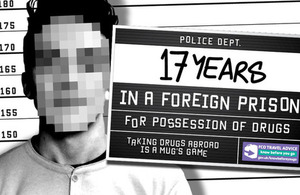Drugs leave hundreds of Brits behind bars overseas
FCO and Prisoners Abroad unite to warn of consequences of drugs abroad.

Taking drugs abroad is a mug's game
More than 850* British nationals are currently locked up in prisons across the globe for drug-related offences, often detained for months without trial and facing distressing living conditions. The Foreign & Commonwealth Office (FCO), in conjunction with the charity Prisoners Abroad, is launching a campaign to highlight the consequences of the use, possession and smuggling of drugs in countries around the world.
The zero-tolerance approach of some countries often results in strict penalties which can come as a shock to British travellers. Offences that may carry cautions in the UK are often penalised with long prison sentences when overseas. Some drug crimes can lead to even more severe penalties, and in 33 countries or territories some drug offences carry the death sentence.**
Some nations keep people on remand for years before their case is heard. Prisoners Abroad is currently supporting 80 Brits between the ages of 18 and 30 held in foreign countries for drugs offences – two thirds of these are still awaiting trial while others are serving sentences from a year to nearly 39 years.***
Terry Daniels and Billy Burton are two British nationals that have seen valuable years of their life spent in prisons overseas. Both want to see the number of Britons involved in drugs in other countries reduced and have described their experiences in a video to warn others not to make their mistakes.
Mark Simmonds, Minister for Consular Affairs, said:
People continue to be astonished at some of the penalties handed down for certain crimes overseas. In some countries possessing small amounts of marijuana can lead to decades in prison. In the last year alone consular staff handled over 650 drug-related cases. We want to reduce this number significantly.
Laws, penalties and sentences vary considerably around the world for the use, possession and trafficking of all types of drugs. When it comes to drugs our message is clear – don’t take risks, the consequences are simply not worth it.
Prison conditions also vary significantly from country to country. Some Brits spend years behind bars confronting tough conditions every day. Sanitary standards and food can be very poor and some find themselves detained in crowded cells with many other inmates. Being far away from home and unable to speak the local language, many also feel isolated.
Pauline Crowe, chief executive of Prisoners Abroad, said:
In many countries, men and women find themselves without access to food, clean water and the most basic of medical care. We urge people to consider the unsanitary conditions, overcrowded cells and the constant threat of disease before they get involved in drugs. They may have to live through these conditions for many, many years.
Here are just some of the penalties you could face around the world…
| Country | Laws |
|---|---|
| Thailand | Possession of even very small quantities of drugs can lead to imprisonment. If you are found guilty of being in possession of a small quantity of marijuana you are risking a prison sentence and a heavy fine. If you are found guilty of being in possession of in excess of 20 grams of a Class A drug you would be deemed as a trafficker and could potentially be sentenced to death. |
| United Arab Emirates | Sentences for drug trafficking for possession of even the smallest amount of illegal drugs can lead to a minimum 4-year jail sentence. The Emirati authorities count the presence of drugs in the blood stream as possession. |
| Peru | More than 30 British nationals are currently in prison in Peru for drugs offences. Drug smugglers face long terms of imprisonment. |
| Indonesia | Possession, trafficking and manufacture of any illegal drugs are serious offences in Indonesia. The Indonesian authorities have a zero-tolerance policy and those caught face lengthy prison sentences or the death penalty, usually after a protracted and expensive legal process. |
If you have any enquiries for FCO consular staff before you go or while abroad you can now ask questions via the FCO’s new Twitter service @FCOtravel. This service adds to the ways that British people travelling or living overseas can already get in touch with the FCO: by emailing the travel advice team or contacting local consular staff.
You can also keep up-to-date with the latest FCO travel advice by signing up to the FCO’s Facebook and Twitter feeds.
Further information
For further information, interviews or case studies please contact the Know Before You Go team on 0207 478 7840 or fcoteam@grayling.com
*Latest figures from the Foreign & Commonwealth Office. Over the past six months 32% of British detentions abroad are for drug offences. There are currently 2,760 British nationals detained overseas
**Figures from Harm Reduction International
***Latest figures from Prisoners Abroad, November 2013
-
The FCO’s Know Before You Go campaign encourages British nationals to prepare for their foreign travel so they can avoid preventable problems. Please see our full holiday checklist
-
The Know Before You Go campaign targets a number of audiences, from gap year students to package holidaymakers; sports fans to older travellers and people visiting friends and family abroad. The campaign works with around 600 travel industry partners to communicate its messages. For more information visit our Know Before You Go page
-
Prisoners Abroad is a charity that provides support for Britons imprisoned overseas and their families in the UK. Right now the charity is supporting over 1,200 prisoners in more than 85 countries
-
669 British nationals were arrested for drug-related offences in 2012-13, as outlined in the FCO’s annual British Behaviour Abroad report published in July 2013
-
The FCO has reissued the “Too Late Now” information film about the risks of drug trafficking, originally released in 2011.